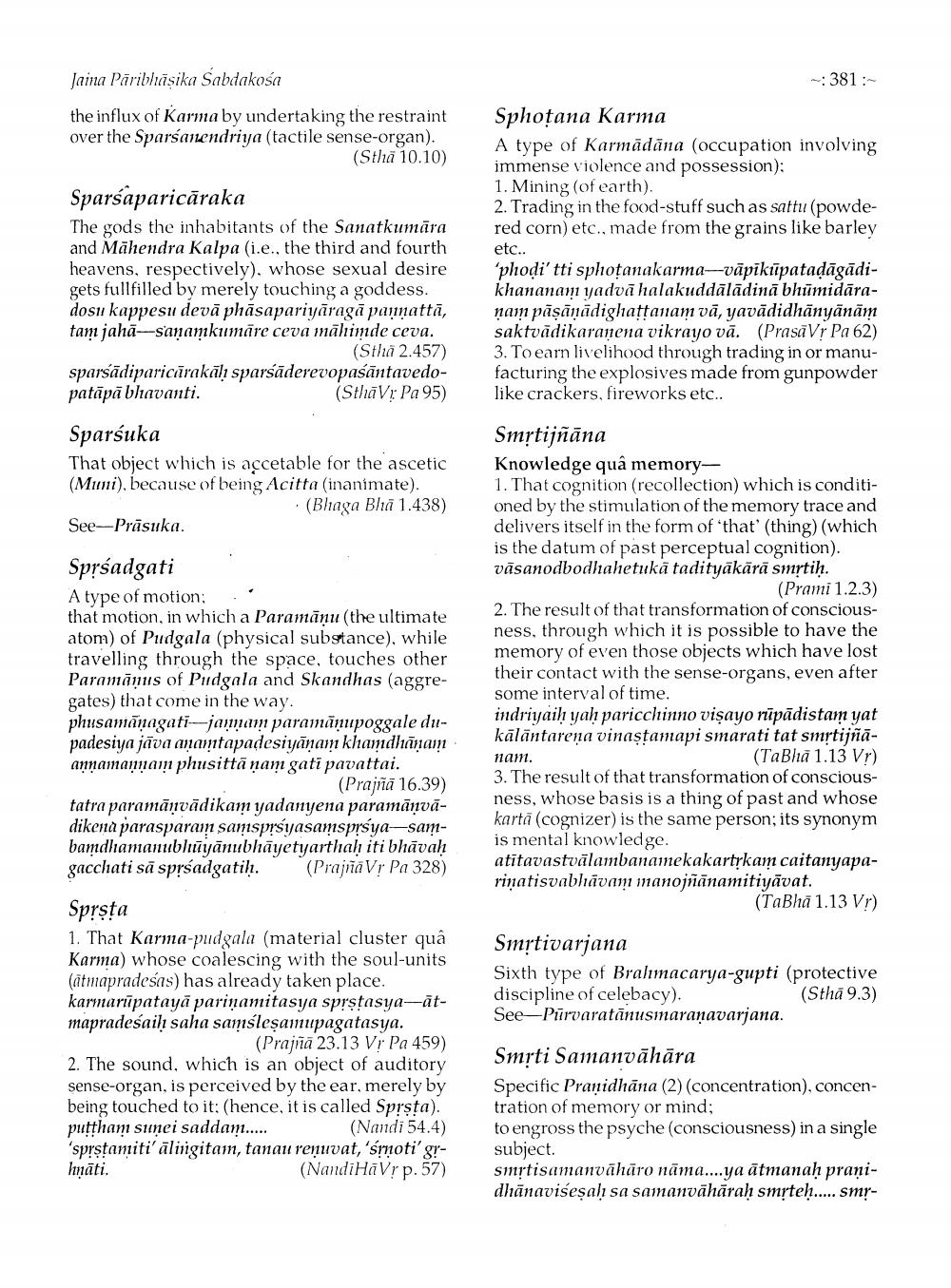________________
Jaina Pīribluāsika Sabdakosa
381 :
the influx of Karma by undertaking the restraint over the Sparsanendriya (tactile sense-organ).
(Sthā 10.10)
Sparsaparicāraka The gods the inhabitants of the Sanatkumāra and Mahendra Kalpa (i.e., the third and fourth heavens, respectively), whose sexual desire gets fullfilled by merely touching a goddess. dosi kappesu devā phāsapariyāragā pannattā, tam jahā-sanamkumāre ceva mālimde ceva.
(Stha 2.457) sparsādiparicarakāli sparsāderevopasāntavedopatāpā bhavanti.
(SthāV: Pa 95)
Sphotana Karma A type of Karmādāna (occupation involving immense violence and possession); 1. Mining (of earth). 2. Trading in the food-stuff such as sattu (powdered corn) etc., made from the grains like barley etc.. 'phodi' tti sphotanakarma-vāpikūpatadāgādikhananam yadvā halakuddālādinā bhümidāraņam pāşāņādighattanam vā, yavādidhānyānām saktvādikaranena vikrayo vā. (Prasā Vr Pa 62) 3. To earn livelihood through trading in or manufacturing the explosives made from gunpowder like crackers, fireworks etc..
(Slog
Sparśuka That object which is accetable for the ascetic (Muni), because of being Acitta (inanimate).
(Bhaga Bhā 1.438) See-Prāsuka.
Sprsadgati A type of motion: that motion, in which a Paramānu (the ultimate atom) of Pudgala (physical substance), while travelling through the space, touches other Paramānus of Pudgala and Skandhas (aggregates) that come in the way. phusamānagati--janam paramānupoggale dupadesiya jāva anamtapadesiyānam khamdhānam annamannai phusittā nam gati pavattai.
(Praj7a 16.39) tatra paramānvādikamyadanyena paramānvādikena parasparain samsprsyasamsprsya-sambamdhamanubluyānubhāyetyarthah iti bhāvah gacchati să sprsadgatih. (Prajna Vr Pa 328)
Smrtijñāna Knowledge quâ memory1. That cognition (recollection) which is conditioned by the stimulation of the memory trace and delivers itself in the form of that' (thing) (which is the datum of past perceptual cognition). vāsanodbodhahetukā tadityākārā smrtih.
(Prami 1.2.3) 2. The result of that transformation of consciousness, through which it is possible to have the memory of even those objects which have lost their contact with the sense-organs, even after some interval of time. indriyaih yah paricchinno visayo rūpādistam yat kālāntarena vinastamapi smarati tat smrtijñānam.
(Tabhā 1.13 Vr) 3. The result of that transformation of consciousness, whose basis is a thing of past and whose karta (cognizer) is the same person; its synonym is mental knowledge. atītavastvālambanamekakartykam caitanyapariņatisvabhāvam inanojñānamitiyāvat.
(Tabhā 1.13 Vr)
Smrtivarjana Sixth type of Bralımacarya-gupti (protective discipline of celebacy).
(Sthā 9.3) SeePurvaratānusmaranavarjana.
Sprsta 1. That Karma-pudgala (material cluster quâ Karma) whose coalescing with the soul-units (åtmapradesas) has already taken place. karmariīpatayā parinamitasya sprstasya-atmapradesaih saha samslesamupagatasya.
(Prajna 23.13 V! Pa 459) 2. The sound, which is an object of auditory sense-organ, is perceived by the ear, merely by being touched to it: (hence, it is called Sprsta). puttham sunei saddam.....
(Nandi 54.4) 'sprstamiti'ālirigitam, tanau renuvat, 'sınoti' grImāti.
(Nandi HÔVr p.57)
Smrti Samanvāhāra Specific Pranidhāna (2) (concentration), concentration of memory or mind; to engross the psyche (consciousness) in a single subject. smrtisamanvāhāro nāma....ya ātmanah pranidhānavisesan sa samanvāhārah smrteh..... Smr




